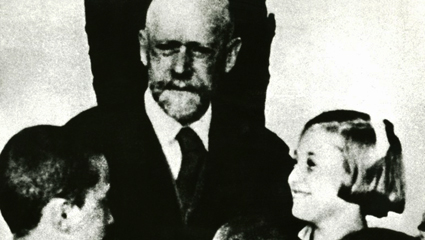
repr. Laski Diffusion / East News
This year Poland celebrates the life and works of Henryk Goldszmit, better known by his pseudonym Janusz Korczak. He is remembered today primarily for his contributions to education as a great authority when it came to custodial pedagogy, yet he was an accomplished writer as well, taking on a range of literary forms to pursue varied social topics, from medicine and pedagogy to hygiene, politics and interpersonal relationships. The Korczak Year ushers in a series of events and publications in honour of his contribution to literature and science.
Korczak (born 1878 or 1879) debuted in 1896 in the satirical weekly Kolce with the humorous sketch "The Gordian Knot" and most likely entered the final entries in his "Diary" on the 4th of August 1942 in the Warsaw ghetto. Between these two dates he created many unique works that are not known well enough today to be given the credit they deserve. His body of work was addressed both to adults and children, consisting of literary works, social journalism, pedagogical essays, theatrical plays and personal document literature, such as letters to friends, notes, documentation of his educational practice, private documents and his diary from the last months of his life. Altogether this amounts to over twenty books (novels, stories, poetic prose and essays) over 1400 various texts printed in magazines (journalism, small literary forms, interviews) and over 300 positions preserved in the form of manuscripts or typescripts. Because Korczak’s field of activity was so diverse and prolific, there is a relatively large collection of his writings remaining in spite of the damage done by the war.
At present the publication of a sixteen volume edition of Korcak’s collected works is being finalised by the KORCZAKIANUM Centre for Documentation and Research – a department of the Historical Museum of Warsaw. It’s the first comprehensive research-editorial project presenting Korczak’s known and preserved writing legacy. The first volumes appeared in 1992 and the completion of the series – the publishing of pedagogical writings from the interwar period and texts created in the years 1939-1942 – is planned for the year 2012, the official Korczak Year.
This year Poland commemorates two separate dates in Janusz Korczak's life, the 70th anniversary of his death at the Treblinka camp during the war and the 100th anniversary of his founding the House of Orphans in Krochmalna street in Warsaw (currently Jaktorowska street). In September the Parliament passed a resolution declaring the year 2012 the Janusz Korczak Year at the initiative of Marek Michalak, the Ombudsman for Children in Poland.
"I hope this shall also be the year of children’s rights", Michalak told Polish Press Agency PAP and added, "I expect this year to be a year of deep thought about children’s affairs, about how to enhance communicating with them and how to take care of their safety"
A number of initiatives in tribute of Korczak, a man who contributed tremendously to the welfare of children of all walks of life, are planned for the upcoming year. Michalak spoke of his plans to organise 16 conferences across Poland for experts and scientists, as well as children and youth. Michalak also plans to publish Korczak’s "How to Love a Child" and "The Child’s Right to Respect", which aren’t currently in print.
The Ministry of National Education has declared that the next year’s Parliament of Children and Youths - organised each year on Children’s Day - shall be devoted to Korczak, the Ministry of Infrastructure announced that it will issue a post stamp with an image of Korczak, the Ministry of Health plans to promote the rights of children patients and the Chief Sanitary Inspectorate wants to point out that Korczak was a precursor of hygiene amongst children and youths.
On the 5th of January the Jewish Historical Institute initiated its celebration of the Korczak Year. The institute has prepared a series of meetings with prominent intellectuals entitled My Korczak.
The Ministry of Culture and National Heritage intends to take part in the celebrations through its institutions: the Book Institute, which holds the rights to Korczak’s works, the Theatrical Institute, the National Library and others. Warsaw City Hall declared that the orphanage in Jaktorowska street shall be refurbished beginning this year.
The Ministry of Foreign Affairs intends to promote Poland with Korczak in all its diplomatic posts. Once a month an essay on Korczak is to be placed on every embassy’s internet site. The Commisioner for Human Rights of the Council of Europe Thomas Hammarberg offered the Ombudsman cooperation in promoting Korczak’s message all over Europe. He gave the idea to translate Korczak’s works and publish them in countries other than Poland. He declared that there is an exhibition on Korczak in preparation in the Council of Europe headquarters in Strasbourg.
The Kidprotect.pl Foundation has planned the project Station Korczak for 2012. Chairman of the Kidproject.pl Foundation Jakub Śpiewak explains that "We want to show young people, that Korczak isn’t just some old-timer from before the war, that he’s actually somebody close to them. The foundation strives to encourage young people to speak with their own voice about Korczak, to prepare performances, record their versions of songs inspired by Korczak’s texts. It also wants schools to become involved in popularizing Korczak, for instance to organize field trips following the Korczak route, for which the foundation is preparing guidebooks.
The Korczak Congress organized by the Ombudsman for Children in Poland is to be the culmination of the Korczak Year. "I hope this will be a year of promoting Poland as a country, where children’s rights were born, a country which had Janusz Korczak and a country that came up with the idea of passing a convention of children’s rights", Michalak stated. He also expressed hope that the Korczak Year will enable us to become "better people towards children".
See more on Korczak's writings in Janusz Korczak - Legacy of a Writer and Pedagogue